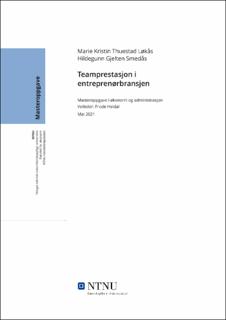| dc.contributor.advisor | Heldal, Frode | |
| dc.contributor.author | Løkås, Marie Kristin Thuestad | |
| dc.contributor.author | Smedås, Hildegunn Gjelten | |
| dc.date.accessioned | 2021-09-22T16:02:56Z | |
| dc.date.available | 2021-09-22T16:02:56Z | |
| dc.date.issued | 2021 | |
| dc.identifier | no.ntnu:inspera:82735216:84790030 | |
| dc.identifier.uri | https://hdl.handle.net/11250/2780471 | |
| dc.description.abstract | Denne masteravhandlingen er et forskningsbidrag som undersøker teamprestasjon i entreprenørbransjen. Entreprenørbransjen er en kompleks og sammensatt bransje med et bredt spekter av aktører involvert. Disse forholdene kompliserer det å jobbe sammen i team, da en rekke ukontrollerbare faktorer påvirker teamarbeidet. Hensikten med studien er derfor å skape en forståelse for hva som kan fremme teamprestasjon i entreprenørbransjen, og følgende forskningsspørsmål ligger til grunn for studien:
Hvilke faktorer oppleves å ligge til grunn for teamprestasjon i entreprenørbransjen?
For å belyse dette forskningsspørsmålet har vi gjennomført en casestudie av en av Norges største entreprenørbedrifter, der vi har studert to ulike funksjonærteam. I samråd med bedriften er navnet anonymisert, og bedriften vil derfor gjennomgående bli betegnet som Entreprenørbedriften. Studiens datagrunnlag består hovedsakelig av kvalitative dybdeintervjuer, men vi har også benyttet en kvantitativ SPGR-undersøkelse som et supplement til disse intervjuene. Ut fra studiens teorigrunnlag har vi utviklet en egen modell, som vi avslutningsvis i oppgaven reviderer basert på våre funn.
Denne studien viser at teamprestasjon må forstås som interne teamprosesser fremfor måling av resultater. Prestasjon er imidlertid et abstrakt og subjektivt begrep som kan være krevende å undersøke. Våre funn peker likevel på en rekke faktorer som oppleves som betydningsfulle. Tett og hyppig kommunikasjon blant teammedlemmene fremstår som limet i teamarbeid i entreprenørbransjen, ettersom koordinering mellom komplementære ferdigheter og oppgaver er viktig for å gjennomføre prosjekter. Oppstartsfasen er spesielt viktig for team i entreprenørbransjen, da den legger grunnlaget for utvikling av psykologisk trygghet og delte mentale modeller. Våre funn viser at både oppgave- og teamrelaterte delte mentale modeller er viktig for teamprestasjon. Studien viser imidlertid at delte mentale modeller må diskuteres og opprettholdes utover i prosjektet, og derfor er daglige møter med prosjektteamet viktig. Et annet funn er at presterende team oppleves som en familie, med rom for ærlige og konstruktive diskusjoner. Denne familiefølelsen er gunstig for teamprestasjon kun inntil en viss grense, ettersom en for sterk familiefølelse kan resultere i stagnasjon og gruppetenkning. Utover dette viser studien at prosjektlederen har en viktig rolle i prosjektteamene, gjennom å inkludere og tilrettelegge for et godt samarbeid mellom teamdeltakerne. | |
| dc.description.abstract | This master thesis is a research contribution that examines team performance in the construction industry. The construction industry is a complex and composite industry with a wide range of different parties involved. These conditions complicate working together in teams, as several uncontrollable conditions affect the teamwork. Therefore, the purpose of this study is to understand what factors that might promote team performance in the construction industry, and the following research question forms the basis of the study:
What factors are assumed to be the basis for team performance in the construction industry?
In order to illuminate this research question, we have conducted a case study of one of Norway's largest construction companies. We have studied two of their project staff teams. In dialogue with the company, we agreed to anonymize the company's name, and it will throughout this master thesis be referred to as Entreprenørbedriften. The study's data mainly consists of qualitative in-depth interviews, but we have also used a quantitative SPGR-survey as a supplement to these interviews. Based on the study’s theoretical foundation, we have developed a model which has been revised based on our findings.
This study indicates that team performance must be understood as internal team processes rather than the mere measurements of their results. First and foremost, close and frequent communication among the team members appears to be a key factor in teamwork in the construction industry, as coordination between complementary skills and tasks is important in the execution of the projects. The initial phase is especially important for teams in the construction industry, as it forms the foundation for the development of psychological safety and shared mental models in the team. Our findings show that both task- and team-related shared mental models are important for team performance. However, the study shows that shared mental models must be discussed and maintained throughout the project, and therefore daily meetings with the entire project team are important. Another finding is that performing teams are perceived to act as a family, where honest and constructive discussions are acceptable. This family feeling is favourable for team performance up to a certain degree. A too strong family feeling may result in stagnation and group thinking. Furthermore, the study shows that the project manager has an important role for project teams in the industry, by including team members and facilitating a good collaboration between them. | |
| dc.language | nob | |
| dc.publisher | NTNU | |
| dc.title | Teamprestasjon i entreprenørbransjen | |
| dc.type | Master thesis | |
